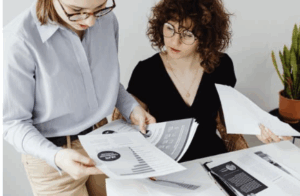
Notarization in Virginia:
A Complete Overview
In Virginia, a Notary Public is a trusted individual appointed by the Governor and the Secretary of State to play an important role in safeguarding legal transactions. Their primary responsibility is to act as an impartial witness, verifying the identity and signature of individuals, administering oaths, and certifying documents. By doing so, notaries help prevent fraud and ensure the authenticity and integrity of important legal processes.
What Does a Notary Public Do?
At its core, a notary public acts as an impartial witness in various legal and business matters. Their primary duties include:
- Verifying Identity: Notaries confirm the identities of individuals involved in a transaction, ensuring that everyone signing a document is who they claim to be.
- Witnessing Signatures: By observing signatures, notaries certify that documents are signed willingly and without coercion.
- Administering Oaths: For documents requiring sworn statements, notaries administer oaths to affirm the truthfulness of the information provided.
- Certifying Documents: Notaries attach their official seal to confirm the document’s authenticity and their role in verifying its validity.
Why Are Notaries Important?
Notaries serve as gatekeepers for trust in legal and financial transactions. By verifying identities and overseeing the signing of documents, they ensure:
- Fraud Prevention: Notaries help reduce the risk of identity theft or forged signatures.
- Document Authenticity: Their official seal and signature lend credibility and legal weight to important papers.
- Peace of Mind: For both individuals and businesses, having a notary involved adds a layer of security and confidence in the transaction.
In real estate transactions, for example, notaries ensure that property deeds and mortgage documents are valid and correctly executed. In other legal contexts, their involvement can protect individuals from disputes or challenges to the authenticity of documents.
Notarial Responsibilities and Powers:
Notaries play an essential role in creating trust and confidence in legal and business dealings. Their work helps ensure that documents are authentic, agreements are made willingly, and everything is done by the book. Let’s take a closer look at the key responsibilities and powers of notaries and how they make a difference.
- Notarys Key Responsibilities:
- The Notary’s Powers:
Notary Service Responsibilities
Verification of Signer’s Identity: Notaries verify the identity of the signer to ensure they are who they claim to be.
Recording Identification and Witness Information: Notaries will record the signer’s identification information and any witness information for our notarial record.
Authentication of Signatures: Notaries confirm that signatures on documents are genuine and made voluntarily.
Administering Oaths and Affirmations: Notaries oversee oaths for affidavits and other legal statements, ensuring they are sworn truthfully.
Certifying Documents: Notaries can certify copies of original documents as true copies when required.
- A Virginia notary may refuse to notarize a document for any reason.
- Virginia notaries may notarize powers of attorney and wills.
Now that you know what a notary public does and how they can help, you might be ready to get your document notarized. To make the process as simple and hassle-free as possible, we’ve outlined everything you’ll need to bring to your appointment with Elite Documents. Check out the details below to ensure you’re fully prepared!
What to Bring to Your Notary Appointment
Preparing for a notary appointment ensures a smooth and efficient process. To avoid any delays or complications, here’s a checklist of what you’ll need to bring:

- The Document(s) to Be Notarized:
- Ensure the document is complete and ready for signing. All necessary information should be filled out, but do not sign it until you are in the presence of the notary.
Valid, Unexpired Government-Issued Identification:
- Acceptable forms of ID include a driver’s license, passport, or state-issued ID card. The ID must be unexpired and clearly show your name, photo, and signature.
Any Required Witnesses:
- If your document requires witnesses, ensure they are present and bring valid identification as well. The notary may need to verify their identity too.
Knowledge of the Required Certification:
- Determine whether your document needs a Jurat, Acknowledgment, or Certified Copy. Understanding this will help the notary apply the correct certification.
Payment:
- We accept payment in cash, Venmo, Zelle, and credit cards. Be sure to confirm the payment method with the notary beforehand.
Additional Documents (if applicable):
- If your document references other supporting documents, make sure to bring those along for verification. This ensures the notary can confirm the accuracy and integrity of all related materials.
Having all of these items prepared will ensure a smooth and efficient notarization process! Let me know if you have any questions or need assistance.
Acceptable Forms of Identification (Must Be Unexpired):
To ensure proper verification, notaries and other officials require one of the following unexpired forms of identification:
- United States Passport
- United States Passport Card
- Certificate of United States Citizenship
- Certificate of Naturalization
- Foreign Passport
- United States Green Card (Permanent Resident Card) with Photograph
- State-Issued Driver’s License
- State-Issued Identification Card
- United States Military Identification Card
These documents must be valid at the time of presentation and include sufficient information, such as a photograph and signature, to verify the individual’s identity.
It’s Time to Choose the Right Certification for Your Notarization
- 1. Taking acknowledgments:
- 2. Jurat
- 3. Certifying “true copies” of documents
A notarial acknowledgment is a formal declaration made by an individual before a notary public, confirming that they signed a document willingly and that their signature is genuine. During this process, the notary verifies the signer’s identity and ensures they understand the document’s contents.
Notarial acknowledgments are commonly used to validate various legal documents such as deeds, contracts, powers of attorney, mortgages, and real estate transactions.
An acknowledgment certificate indicates that the signer:
- The signer was identified by the notary.
- The signer either signed the document before appearing before the notary or in the notary’s presence.
- The signer declared to the notary that the signature on the document was made willingly.
Verbal Ceremony performed:
“Do you acknowledge that you signed this document voluntarily and for the purposes stated therein?”
Preparing your Document for Notarization:
When preparing a document for notarization, ensure that it includes the necessary notarial language and has enough space for the notary’s stamp and signature. If your document does not contain the required notarial wording or lacks sufficient space, the notary will need to attach a separate notarial certificate to complete the process properly. This step is crucial to ensure the document’s legality and compliance with notarial standards.
Below is a sample of the notarial language you might need:
—————————————————————————————————————————————————————————————————————————————————
Certificate of Acknowledgment:
City/County of_________________
Commonwealth of Virginia
The foregoing instrument was acknowledged before me
this ___ day of ___, 20 _____ by _____________________________
(Name of person seeking acknowledgment)
Notary Public’s signature ________________________ Notary Seal
Notary Public’s Name ________________________
Notary registration number:____________________________
My commission expires: ____________________________
A notarial jurat is a statement at the end of a document, signed and sealed by a notary public, confirming that the person who signed the document swore to or affirmed its truthfulness in the notary’s presence.
Notarial jurats are often used in affidavits, depositions, and other legal papers where the signer must declare true information under oath. This adds formal authentication to the documents, ensuring they are legally valid.
For a jurat to be valid:
- The signer must appear before the notary.
- The notary must identify the signer.
- The signer must take an oath or affirmation in the notary’s presence and verbally confirm the document’s truthfulness (silent nods are not sufficient).
- The document must be signed by the signer in the notary’s presence.
During the verbal ceremony:
- Oaths are used for those willing to swear on a religious text, asking: “Do you solemnly swear under penalty of perjury that the statements in this document are true and correct to the best of your knowledge?”
- Affirmations are used for those with objections to oaths due to religious beliefs, asking: “Do you affirm under penalty of perjury that the statements in this document are true and correct to the best of your knowledge?”
—————————————————————————————————————————————————————————————————————————————————
Sample Jurat
City/County of ______________________
Commonwealth of Virginia
The foregoing instrument was subscribed and sworn
before me this ___ day of ___, 20 _____ by_______________________________________
(name of person seeking jurat)
Notary Public’s signature ________________________ Notary Seal
Notary Public’s Name ________________________
Notary registration number:____________________________
My commission expires: ____________________________
What is a Certified Copy?
A certified copy is a copy of an original document that a notary public confirms as a true and accurate reproduction. This certification is often needed for various legal, business, and personal transactions, such as proving the authenticity of documents for court proceedings, real estate transactions, or international use.
Virginia Notaries and Document Certification
In Virginia, notaries public have specific duties and limitations when it comes to certifying copies of documents:
Personal Knowledge: The notary must have personal knowledge that the copy is a true and accurate reproduction of the original. This usually means the notary must have compared the copy to the original document.
Allowed Documents: Virginia notaries can certify copies of most documents, but there are some exceptions. Notaries cannot certify copies of vital records (such as birth, death, and marriage certificates) or certain public records (such as court documents). These documents must be certified by the issuing agency.
Proper Procedure: To certify a copy, a Virginia notary must:
- Compare the copy to the original document.
- Write a statement on the copy indicating it is a true and accurate reproduction of the original.
- Sign and seal the document with their official notary stamp.
Steps for Certifying a Copy in Virginia
If you need a Virginia notary to certify a copy of a document, follow these steps:
- Present the Original: Bring the original document and the copy you want to be certified to the notary.
- Verification: The notary will compare the copy to the original to ensure it is an exact reproduction.
- Certification Statement: The notary will write a statement on the copy, such as “I certify that this is a true and correct copy of the original document.”
- Signature and Seal: The notary will sign the statement and affix their official notary seal.
Important Considerations
- Vital Records and Public Documents: As mentioned earlier, Virginia notaries cannot certify copies of vital records or certain public documents. You must obtain certified copies of these documents directly from the issuing agency.
- International Use: If you need a certified copy for use in another country, additional steps may be required, such as obtaining an Apostille certificate. This process ensures the certified copy is recognized in the foreign country.
—————————————-Notarial Certificate ————————————-
Certified Copy of an Original:
City/County of_________________________
Commonwealth of Virginia
I certify this to be a complete, full, true and exact reproduction of the original document.
Certified this_____ day of _____, 20 _____.
Notary Public’s signature ________________________ Notary Seal
Notary Public’s Name ________________________
Notary registration number:____________________________
My commission expires: ____________________________
Now, Book Your Appointment in 3 Easy Steps
-
Understand the service requirements.
Make sure you have all the necessary documents and identification ready. If you have any questions about what’s required, feel free to reach out to us for clarification. This ensures a smooth and efficient notarization process.
-
Choose Your Booking Date and Pre-Pay for the Notarial Appointment:
Select a date and time that works best for you from our available slots. Pre-paying secures your appointment, allowing us to allocate the necessary resources and guarantee your preferred time. We accept various payment methods including cash, Venmo, Zelle, and credit cards.
-
Send Us a Text Message with Your Payment Confirmation:
Once you’ve completed the payment, text us with your confirmation and preferred location for the notarization. If you haven’t chosen a location, we’ll provide a convenient meeting spot for you. This step finalizes your booking and allows us to prepare for your appointment.
Schedule Your Notary Appointment Online with Ease
We understand that scheduling can be a challenge, which is why we offer mobile services for your convenience. If you require an appointment outside our regular hours, please don’t hesitate to reach out to us directly. We are dedicated to providing flexible solutions and will do everything we can to accommodate your needs.”
Our Mobile Notary Rates
Virginia Weekday Mobile Notary
- Mobile fee for Arlington & Alexandria ($35)
- 1 Notarization ($10)
Additional notarial stamps are $10 each. A surcharge applies for services in Falls Church, Tysons, McLean, Springfield.
Virginia Weekend & Emergency Mobile Notary
- Mobile fee for Arlington & Alexandria ($45)
- 1 Notarization ($10)
Additional notarial stamps are $10 each. A surcharge applies for services in Falls Church, Tysons, McLean, Springfield.
Notice: Limitations of Notary Services
Come for the Insights, Stay for the Expertise – Explore Our Posts
Moving Abroad? How Elite Documents Simplifies Paperwork for Americans Relocating Overseas – Copy
Moving to a new country can be exciting, but dealing...
Read MoreBringing the World Full Circle: Bureaucracy.es in (Spain) and Elite Documents in the (USA)
Embarking on the journey of moving to Spain becomes a...
Read MoreTexas Certificate of Fact and Apostilled by the Texas Secretary of State
Simplifying International Legal Processes with Elite Documents When time-sensitive international...
Read MoreFBI Report Apostille Assistance with the U.S. Department of State (202) 485-8000
The traditional mailing process for obtaining an Apostille for your...
Read MoreGet the Latest Insights Delivered to Your Inbox – Subscribe Now!
Stay in the Loop – Follow Us on Social Media!




